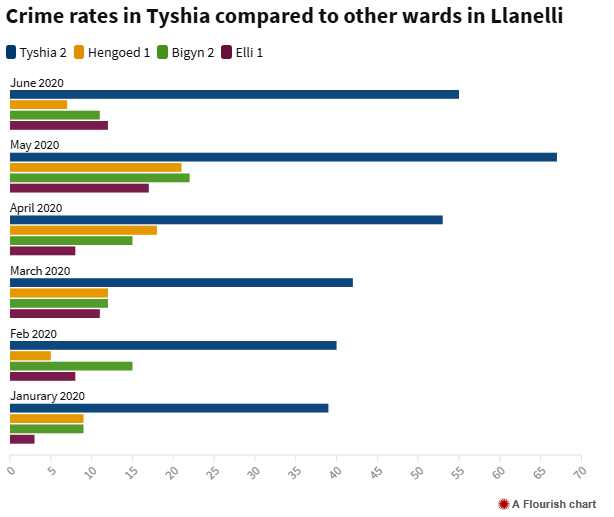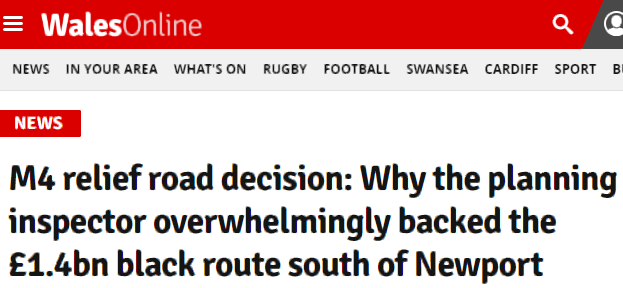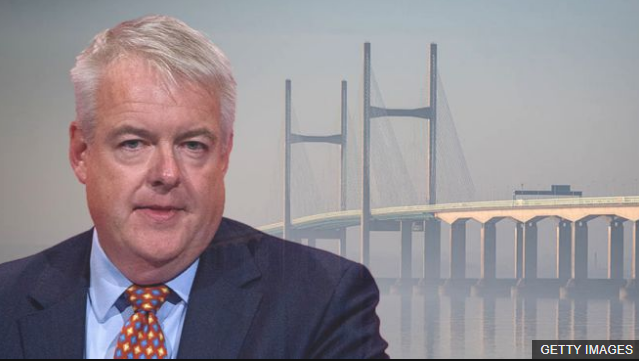PLEASE APPRECIATE THAT I GET SENT MORE INFORMATION AND LEADS THAN I CAN USE. I TRY TO RESPOND TO EVERYONE WHO CONTACTS ME BUT I CANNOT POSSIBLY USE EVERY BIT OF INFORMATION I’M SENT. DIOLCH YN FAWR
♦
![]() We are confronted by a paradox. The stock of housing in Wales is growing, yet less and less of it is accessible to Welsh people.
We are confronted by a paradox. The stock of housing in Wales is growing, yet less and less of it is accessible to Welsh people.
◊
INTRODUCTION
What I’m describing is a bizarre housing system that works against the native population while promoting the interests of strangers. A system too complex and too consistent in its outcomes to be attributed to incompetence or happenstance.
Once the bigger problem is deconstructed and its component parts exposed, then remedies present themselves. All that’s needed then is the political will to implement those remedies.
In this article I shall explain a problem and then make one or more suggestions for tackling it. I’m sure many of you reading this will have your own ideas – so let’s hear them.
◊
PRICES, TOO HIGH AND TOO LOW
When dealing with house prices we find problems at both ends of the scale. On the one hand, houses are being built in many areas that most locals can’t afford – but that’s OK because they’re not intended for us.
Take Newport, Pembrokeshire, a ‘holiday hotspot’. Locals are being squeezed out of the local housing market and this shortfall is then used to justify building new housing . . . that is also beyond the reach of locals!
Such as this modest – and rather ugly – three-bedroom home for £425,000.
While at the other end of the scale, in declining seaside resorts and post-industrial areas, property prices are so low that they attract those who buy in bulk and ship in problems.
Which takes us to Llanelli, and the Ty Isha neighbourhood, by the railway station. Third sector bodies, private landlords and others have moved in, bought up terraced houses and flats, and dumped petty criminals and drug addicts from England.

Those who profit from trading in undesirables – with the full support and financial backing of the ‘Welsh Government’ – were initially attracted to Ty Isha by low house prices, and they have succeeded in driving property values down even more!
Some of those interviewed in the report are now trapped in houses they have lived in all their married lives but can only sell at a price below what a house such as theirs would fetch in a normal neighbourhood.
Yet in a system that prioritised Welsh needs the small terraced houses of Ty Isha would make ideal starter homes for young people.
SUGGESTIONS: In the case of Newport, Pembs and countless other such developments, the answer is that we simply do not allow the building of new properties that locals either do not wish to buy or cannot afford to buy.
I’ll explain later how we could both achieve this and forecast local need.
To argue that allowing such properties takes the pressure of the existing stock, thereby making many such properties available for local buyers, is absolute bollocks. The numbers wanting to relocate to Wales is limitless, and the demand for holiday homes insatiable.
As for Ty Isha, funding should be withdrawn from any third sector body importing problems from outside of Wales to any part of Wales. The same should apply to housing associations.
I shall also offer suggestions for achieving these objectives.
Those whose properties have been devalued, and their lives affected by the riff-raff dumped around them, should be compensated by the ‘Welsh Government’.
∼
THE NUMBERS GAME
Let’s now focus on the problem of houses being built in numbers greatly in excess of what Wales needs. And, again, at prices most of us can’t afford. This is particularly noticeable in the eastern parts of the country as English commuters look west for cheaper housing and nicer scenery.
Black-spots are along the A55 in the north and the M4 in the south and, since the removal of tolls on the Severn Bridge, increasingly evident in southern Gwent, including the city of Newport. An example would be the 900 dwellings of the ‘urban village’ planned for Mamhilad, north of Pontypool, towards Abergavenny, but close enough to the M4 for Bristol commuters.
Building in Wales to meet a demand from England has also become noticeable around Wrexham in recent years. It begins with the ‘Welsh Government’ producing absurd population projections to justify building an excessive number of new houses.
Then, when the projections are shown to be exaggerated, the Planning Inspectorate insists on sticking with the original number of new houses. This article explains it well.
I looked into this problem back as March 2014 in a piece I wrote about Denbighshire. The council said, “Look, the latest projections suggest a smaller population increase, so we don’t need to build so many new houses”.
The Planning Inspectorate’s response was, “Yes, you’re right about the population projections . . . but we insist on sticking with the original number of new dwellings”.

A response like that sort of gives the game away, doesn’t it?
Back in 2011 the ‘Welsh Government’ was insisting that the population of Wrexham would increase by 20% in the near future, then the projected increase reduced to 10%, and the latest calculation is that the borough’s population will actually fall by 1.5% by 2028! Yet the number of houses ‘needed’ must remain the same as when an increase of 20% was forecast.

As the map above makes clear, the planned developments are all to the north or the east of the town, in other words, convenient for Cheshire. Or rather, convenient for those who aren’t wanted in Cheshire, in order to preserve property values in Wilmslow, Alderley Edge and the other communities of the ‘Golden Triangle’.
Add to all the new housing the proposed road improvements and the fate allotted to Wrecsam becomes clear. The A483 is of course the road to Chester.
Here’s a late addition about 200 more houses at Rhosrobin, right next to the A483.
What has clearly been happening is that the ‘Welsh Government’ (or others acting in its name) has been producing what it knew to be inflated, contrived, population projections. Done to justify building excessive numbers of new dwellings.
When the population projections were exposed as bogus, and revised downwards, the Planning Inspectorate stuck with the discredited figures in order to push on with building what were now clearly excessive numbers of new houses.
And by so doing the Planning Inspectorate exposed a dishonest system.
SUGGESTIONS: To begin with, calculations to determine how many new homes an area needs must be based on what the people of the area need, not on how many properties developers think they can sell. In fact, I can’t think of any good reason why developers need to be involved in assessing demand.
The Wrecsam area being used to take pressure off Cheshire is part of the wider integration strategy of the Mersey Dee Alliance. A giveaway is estate agents referring to the area as ‘West Cheshire’.
The Planning Inspectorate does not serve Welsh interests, it never has. It must be replaced with a new Welsh body free from political interference and divorced from commercial interests.
Why can’t we have a register of those who think they’ll be looking to buy a new home within an area; something similar to the waiting list for social housing. Once people grasp that contributing to such a database will make it more likely they’ll find the home they need then the more likely they’ll be to participate.
∼
HOLIDAY HOMES
A perennial issue in Wales and the Covid lockdown has highlighted the problem. First, it was people sneaking to their holiday homes for lockdown rather than staying at their usual residence, while more recently it’s been the increased demand for holiday homes.
The latest figures for Gwynedd suggest that 40% of the properties being sold in the county are now bought for use as holiday homes. Take the towns out of the calculation and it’s reasonable to assume that a majority of the properties in villages and in the countryside are being sold as holiday homes.
Gwynedd council is run by Plaid Cymru but it has only imposed a 50% surcharge on holiday homes. Yet another example of Plaid Cymru wringing its hands, “Oooh, isn’t it awful, something should be done”, yet when a roar of defiance was needed Plaid Cymru could only whimper.
This is Plaid Cymru terrified of being called ‘anti-English’. That mauling Glenys Kinnock handed out to Ieuan Wyn Jones on Question Time in February 2001 has left a deep and painful scar.

Compare Gwynedd to Swansea, where the Labour-controlled council has imposed a 100% surcharge, (which also applies to properties left empty for a long period). And in case you think this is only a gesture because the city has few holiday homes, there are many hundreds in the waterfront area, and of course, on Gower.
All the arguments used in defence of holiday homes are self-serving bullshit. “Nobody else wanted the place” . . . “But we put so much money into the local economy!” . . . “An essential part of the tourism industry”, etc, etc.
SUGGESTIONS: One simple change in the law would go a long way to easing the misery of holiday homes.
Legislation stating that only 10% of properties in any electoral ward can be registered as holiday homes, with the figure reducing to 5% in 2030 would have a number of immediate effects.
First, in wards where more than 10% of properties are currently registered as holiday homes such legislation would immediately curtail future demand. Knowledge of the change in 2030 would remove the threat of further properties being bought as holiday homes.
Resulting in more properties, at reduced prices, becoming available for locals.
Severe penalties must be imposed for using a property as a holiday home when it is not registered for that use. And the loophole allowing holiday homes to escape council tax by registering as a business must be closed.
To further reduce the demand for holiday homes and increase their contribution to the local community council tax should be charged at a rate of 200%.
Some may think that a 5% figure is too low, others that it’s unduly generous. My belief is that no area of Wales should suffer more than 5% of its housing stock being used by strangers flaunting their greater wealth.
∼
RETIRING TO WALES
An often overlooked factor in inflating house prices is retired and elderly people moving to Wales. The negatives increase when we remember that the older a person is the more likely they are to need medical care of some kind. This is a universal truth.
Which means that this influx will obviously impact on our NHS and other services.
In fact, it’s difficult to think of any benefit Wales derives from people in the older age brackets moving in. But that doesn’t stop some from trying.
Some three years ago I wrote to the ‘Welsh Government’ with a few questions on this subject. What I received by way of an answer contained a paragraph that has caused either mirth, or head shaking, whenever people read it. (For the full letter, click here.)

On a planet where all other countries view an ageing population as a ‘ticking time-bomb’ Wales alone sees the takeover by alien wrinklies as something positive. Or rather, the ‘Welsh Government’ wants us to believe it does.
This is the sort of nonsense that officialdom spouts when it’s cornered. I say that because while the letter I received makes highfalutin’ references to “liberty of movement” the truth is that the ‘Welsh Government’ has enacted legislation that encourages retired and elderly people to move to Wales.

Don’t get me wrong, it’s fine that Welsh people going into care can hold on to £50,000, I might benefit from such a provision myself one day. But it also encourages into Wales people who have spent their working lives elsewhere. And the cost of looking after these elderly goes into the debit column of our national accounts and is used to prove that Wales is a financial basket-case.
I see a boy at the back with his hand up, “How big is the problem, Sir?”
Here’s a table I compiled using data from the 2011 Census. You’ll see that in some local authority areas only a minority of the population in the 65+ age bracket was born in Wales.

With the problem not confined to the north, just look at Ceredigion and Pembrokeshire. There’s a definite correlation between tourism and the numbers of retired and elderly people moving to an area.
Though Flintshire would appear to buck the trend in that it is not a tourism hotspot, but even so, half of the over 65s were born in England. While this can be partly explained by maternity services being located in Chester I can also suggest another explanation.
Let’s say you’re a likely lad living on the Wirral. Aunt Mabel is going to leave you her money, a nice round figure of £100,000. If she goes into a local care home you might only see £23,350, but take her to Mold or Connah’s Quay and you’re guaranteed at least £50,000. More if you can get the local authority to cough up.
And, anyway, is the old girl going to know where she is!
Finally, let’s not forget the political dimension to this phenomenon. It has been proven time after time that the older an English voter is the more likely that person is to be royalist, patriotically British, pro-Brexit, conservative and Conservative.
From a Welsh perspective, encouraging retired and elderly English people into Wales is both an economic and a political disaster. But it benefits England for the same reasons.
SUGGESTIONS: There’s no need to deny Welsh people the £50,000 limit, but insist on 20 years residency in Wales before anyone qualifies.
And let’s stop building retirement bungalows and flats to be advertised over the border. Many of those who move to such properties may be fit and active when they arrive, but Father Time will soon do his work.
Only a country run by idiots drives out its own young people and replaces them with another country’s elderly.
∼
SOCIAL HOUSING
At one time it was so simple – local authorities built and rented council houses. You put your name down on the list and you waited your turn. Obviously there was favouritism shown in certain allocations, but by and large the system worked to the benefit of Welsh communities.
Then came the housing associations and the transfer of council housing stock.
There’s a general and touching misconception that Registered Social Landlords (RSLs), more commonly known as housing associations, have simply replaced councils, and that social housing is universally available for those who cannot afford to buy a home but would rather not rent from a private landlord.
Er, no.
That was the intention, and that may have been how it started under the new system, but things got much more complicated as years went by. Much more complicated.
There are a number of fundamental problems with the way RSLs now operate.
1/ To begin with, social housing in Wales is locked into an Englandandwales system. This was explained to me in December 2010 in a response I received from Nick Bennett, who was then CEO of Community Housing Cymru, the umbrella organisation for housing associations.
He wrote, “There are over 2 million people on waiting lists for social housing”. This figure cannot be for Wales alone, and yet it was provided by the head of the body supposedly responsible for social housing in Wales. And only in Wales.
Bennett emerged a couple of decades ago from under a lily pad in Cardiff Bay as a fully-formed Spad, before becoming a business partner of Labour’s Alun Davies. He then served as CEO at Community Housing Cymru from 2006 to 2014, and since leaving CHC he has guarded the posterior regions of our politicians and civil servants as the Public Services Ombudsman for Wales.
Corruption Bay in mortal form.
Who gets a vacant house may be decided by a third sector body, in contact with a sister body in England, which has ‘recommended’ Chardonnay and her six semi-feral children; the little darlings having been chased out of their last home by neighbours fed up with the thieving and the vandalism.
They get priority treatment, “Cos they is homeless, innit. Little kiddies, look”.
This rehousing of ‘priority cases’ can have catastrophic consequences. As we learnt when Grwp Gwalia of Swansea housed a network of Satan-worshipping paedophiles from London in Kidwelly.
It was never explained why this was done. And no politicians asked . . . because they didn’t want to know. ‘Priority cases’ are still being dumped in Wales, every day.
2/ A more recent problem with housing associations – and there are dozens of them, competing with each other – is that they are now privatised, but still in receipt of public funding.
As if that wasn’t bad enough, nearly all of them have subsidiaries, or private companies that are not subsidiaries but still members of the group. And then there are the partners.
This diversification has led to the mis-use of public funding, an almost complete lack of monitoring and accountability, and RSL group members building private housing for open market sale. Sold to retirees (officially ‘downsizers’), buy-to-rent landlords (officially ‘investors’), and even as holiday homes. While also selling shares in leasehold properties, with the agreements poorly explained and many duped into thinking they’re buying a freehold property.
This, remember, is the hated leasehold system that the ‘Welsh Government’ elsewhere opposes. Yet it is funding RSLs who then slip money under the table to subsidiaries, or partners, to con people into buying a share in a leasehold property.
To explain how confusing it can become, I suggest you read this piece I wrote recently on Cartrefi Conwy and its offshoots. (Scroll down to the section ‘Cartrefi Conwy, Associates, Chinese investors’.)

What a system! What a ‘government’! What a country!
SUGGESTIONS: The bottom line is that what Wales needs is social landlords renting decent housing to Welsh tenants. Nothing more.
We don’t need subsidiaries of RSLs using diverted public funding to build and sell buy-to-rents in Pembrokeshire. Nor do we want convoluted arrangements using Chinese money to build more retirement bungalows and flats on the north coast.
Housing associations are past their sell-by date. A root-and-branch reform of the social housing system is needed. Wales must leave behind the mess created by ‘diversification’ and adopt a system closer to the original council housing model.
One big question will be what happens to the housing stock currently held by RSLs. Seeing as almost all of it was either built by local authorities, or built since stock transfer with money from the ‘Welsh Government’, a strong case could be made to bring it back into public ownership.
This twilight zone of private bodies living off the public purse while also taking out commercial loans with banks and behaving like private developers must end.
In the meantime, to avoid the dumping of undesirables, no one should be allocated a social tenancy by a RSL unless that person has been resident in Wales for at least 10 years.
∼
CONCLUSION
We have a housing sector in Wales that has for years been steadily divorcing itself from the needs of our people. The situation has worsened under devolution.
There is clearly a strategy to settle in Wales as many people as possible who are loyal to the UK or England, in order to ‘secure’ Wales. We can expect this assault on Welsh identity to intensify with Scotland looking more and more likely to choose independence in the next few years.
There is one final weapon in the armoury that can be employed to stem the tide of colonisation. That is the Land Transaction Tax (LTT). It replaced Stamp Duty and it’s already in operation.
Below is a table I’ve compiled showing the current LTT rates with higher rates I’m suggesting as a way to curb the invasion. ‘Existing main residence’ is self-explanatory. Holiday homes are covered by ‘Existing higher residential’.
My suggestions are at the bottom, in yellow. What I’m proposing is higher rates all round for those not already living in Wales. Exceptions could be made for key workers, investors and others deemed necessary for the national good.

I am also suggesting that LTT kicks in lower down the price scale, and there’s a good reason for this. In the Valleys, post-industrial towns, even parts of Swansea, properties sell at prices buyers from prosperous areas of England find irresistible. Many are being bought for the wrong reasons.
Just think back to Ty Isha, Llanelli.
What’s more, most properties bought by retirees will be below the £250,000 threshold, so why should they be free of LTT?
I suppose one response to everything I’ve written will be, “It all depends on the political will”, and clearly that political will is absent. For the following reasons.
- Civil servants of the ‘Wales would be better without the Welsh’ mindset ‘advising’ – some shagging! – ‘Welsh Government’ ministers.
- A zealously Unionist Labour Party containing too many politicians who can dismiss concern for Welsh identity as ‘ugly and narrow-minded nationalism’. And then of course they have their third sector and housing association cronies to think about.
- A Conservative Party (plus a rag-bag of BritNats) who will never object to English people moving to Wales, or the votes they bring. “All British . . . free to move anywhere . . . God Save the Queen.”
- A so-called ‘national party’, Plaid Cymru, scared witless of being called anti-English by the anti-Welsh. And anyway, national survival is nowhere near as important as trans rights, BLM, refugees, getting Trump out of the White House . . .
You’ve read that 40% of the properties now sold in Gwynedd are to be used as holiday homes. I’ll bet that another 40% are bought by people moving from England into Gwynedd permanently. And it’s the same in other rural areas.
Thanks to the refusal of successive ‘governments’ in Corruption Bay to build a rural economy, the forced reliance on ‘shit anywhere’ tourism, the neglect of everywhere other than Cardiff . . . Wales, thanks to the ‘progressive’ parties’ refusal to confront the assimilation agenda, is approaching the point of no return.
To refuse to challenge the assimilation agenda is to accept it.
♦ end ♦





















































































